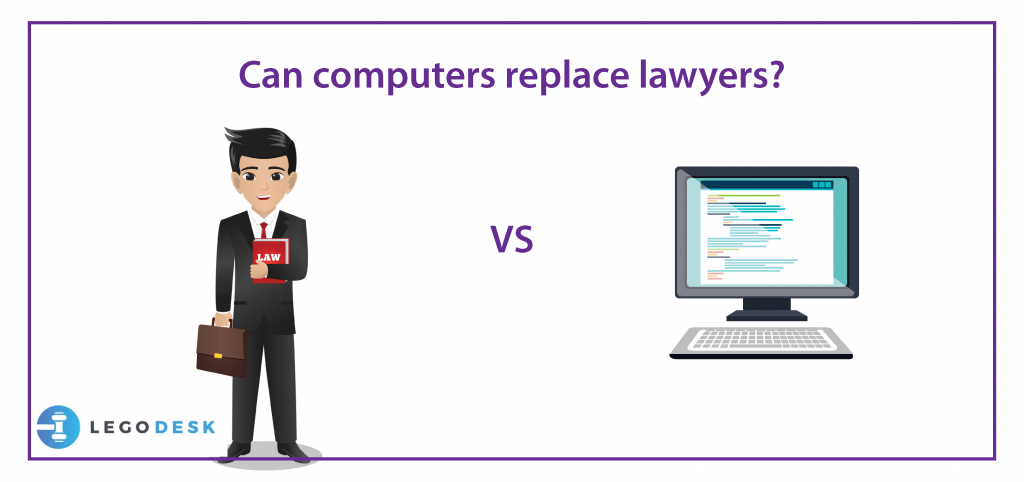Will AI Replace Lawyers?

What is that we mean by saying computers can replace lawyers? All the works done by a lawyer can now be done by a computer? Are the works done by a lawyer so monotonous to be easily able to replicate it? Can machine learning be a game-changer in the legal arena as well? Technology has played a significant role in modernization. Artificial intelligence is a technique that is used to facilitate growth and productivity with the aid of technology. This is developed on machine learning where it can analyze intensive sets of documents that is capable of recognizing patterns, finding similarities, and working on trained algorithms.
Work done by lawyers
To understand can this work be done by computers, we should know what the work done by lawyers is? A lawyer or law firm is qualified to provide a range of services from banking to litigation to real estate, commercial, etc. To sum up the work in brief.
- Attend courts
- Negotiate deals with the clients
- Draft agreements as per the requirements of the client
- Due diligence
- Tedious paperwork
- Research work.
Read Also – Future of AI in the Legal Industry
Can computers replace lawyers?
If I go ahead to answer, who made computers? And now who is training computers? A lawyer who is having so much experience to read and understand the law can them be replaced by computers? Is a computer capable of passing judgment humanly? People are adapting to AI and machine learning techniques to compete with the world and getting a competitive edge.
Let us consider the lawyers who are attending courts and fighting cases and representing clients. Every case has its own facts and different point of law being involved. Being the voice of the client, if a bot fails to identify the problem and find a solution to it, then why will we expect the client to make the payment?
The problems may be predictable at times, but the solution is not always predictable. Sometimes a lawyer needs to think out of the box. So, will this be possible by AI?
We see chatbots these days. Both visual and audio bots. These bots are developed in a way to make the task of a human easier. But if I provide a wrong input to a question, it will not be able to identify it. For example, the question being asked is ‘what is your name?’ and I reply to that message as ‘sorry.’ The bot is unable to process that sorry is not a name. This just being a minute example. So how can AI-enabled computer be expected to represent a client? AI is enabled certainly to undertake all or an administrative job, but it will not be advisable to expect with AI to think logically. Humans have brains, which is what differentiates them, right?
Read Also – Free Legal Aid
In the case of a negotiation proceeding, the AI-enabled may be trained to help where simple things are involved, and two parties are involved, but when complexities arise, it is difficult for it to assist any further. AI techniques can be used when there is uniformity in the process, but negotiations are never uniform.
Reed Smith, which is a leading law firm, tried the technology from the RAVN system. They tested the product for finding out certain points from the contracts by providing keywords. The result proven was favourable. However, it was not always correct and failed to pick up lines many times.
AI may assist the lawyers in the completion of many jobs like verification of Identity of the clients, identifying forged documents, doing research work when provided with specific keywords, review company documents by speedreading with search enabled for specific keywords. A research platform has been developed by ROSS Intelligence, which is used by many law firms worldwide. Such devices being developed may result in a decrease in employment in the legal sector, but will not end altogether. So it is time for lawyers to gear up skills that are not possible by computers.
Read Also – Legal Tech Trends 2019-20
The future generation
The concept of something being right or wrong is not absolute, and a computer cannot be trained on it. AI can help lawyers in many ways, but it is not possible to replace them. It may aid the services which are provided by the lawyers but is not a practically feasible solution to bypass the lawyers altogether. The legal sector, in comparison to other sectors, is always slow in adapting to technological changes. Now, it is slowly engaging in AI-enabled services. They are not replacing lawyers but are complementing them to get the task done more easily.
Read Also – Advocates Act, 1961
Try our Debt Resolution solutions today Request a Demo